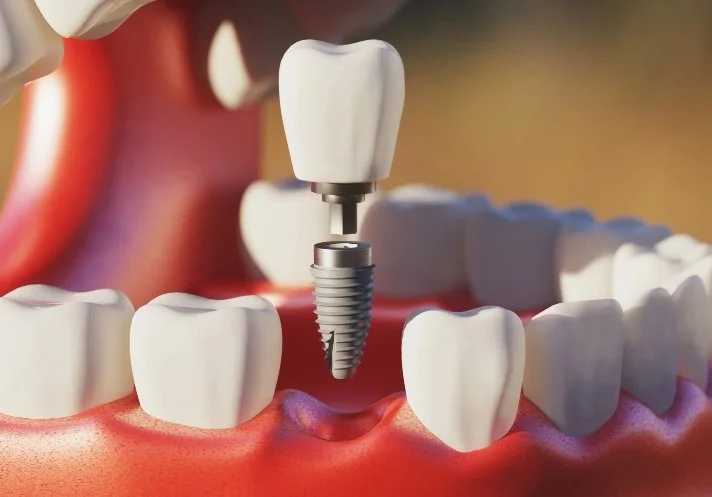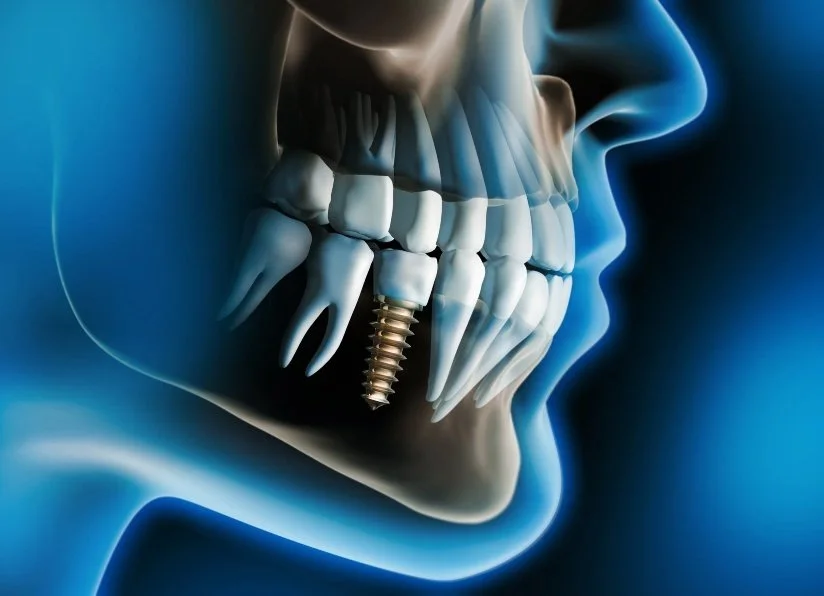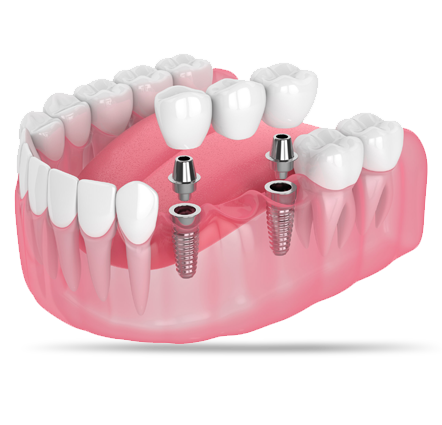Teeth Replacement:
Dental Implants in Walton on the Hill, Tadworth
Restore your smile with advanced tooth implants in Walton on the Hill, offering a secure, natural-looking replacement for missing teeth.
Restore your smile with advanced tooth implants in Walton on the Hill, offering a secure, natural-looking replacement for missing teeth.
Losing a tooth doesn’t have to mean living with discomfort or gaps in your smile. At our clinic in Walton on the Hill, Tadworth, we provide high-quality tooth implant treatments designed to restore the natural look, feel and function of your teeth. Whether you’ve lost a single tooth or need a more extensive solution, our experienced team is here to help with tailored, long-lasting care.
As a trusted implant dentist in Surrey, we’ve supported many patients in rebuilding their smile and confidence through careful planning and skilled treatment. Dental implants are considered the most reliable, secure and natural-looking way to replace missing teeth. They not only improve your appearance but also help preserve jawbone health and bite alignment – things that dentures or bridges can’t always guarantee.
If you're looking for a permanent solution to missing teeth, we’d be happy to assess your suitability and guide you through the process. Our team offers implant consultations in Tadworth and Walton on the Hill, supported by clinical experience, advanced technology, and a calm, respectful approach.

A dental implant is a small titanium post that’s placed into the jawbone where a tooth is missing. It acts as a replacement tooth root and supports a crown (for a single tooth), or a bridge or denture (for multiple teeth). Once the implant integrates with the bone – a process known as osseointegration – it provides a stable, durable foundation that feels very similar to a natural tooth.
Tooth implants are often the preferred option for patients looking for a fixed, low-maintenance alternative to removable dentures or traditional bridges.
We understand that getting a dental implant is a significant decision. That’s why we take a careful, measured approach to every treatment. From your first consultation through to your final result, you’ll receive honest advice, thoughtful planning, and high-quality clinical care.
Patients choose us as their implant dentist in Surrey because:
We use clinically proven materials and techniques, supported by modern diagnostic imaging
Our implant planning is precise and personalised, ensuring a natural look and secure fit
We focus on minimally invasive treatment wherever possible
You’ll be treated in a calm, private setting, with time to ask questions and understand your options
Our team has extensive experience in providing fixed solutions for missing teeth, including complex cases
We’re also able to coordinate your full treatment in-house – from extractions to final restorations – giving you continuity and peace of mind throughout the process.


Dental implants are suitable for most adults who are missing one or more teeth and have healthy gums and sufficient jawbone density. Even if you’ve been missing teeth for some time, or have worn dentures, you may still be a candidate – we’ll carry out a full assessment to determine the best course of action.
A good candidate for tooth implants in Tadworth or Walton on the Hill will typically:
Be in good general and oral health
Be free from active gum disease
Not smoke or be willing to stop during healing
Have sufficient bone in the jaw (or be suitable for bone grafting if not)
We’ll always provide a detailed treatment plan with timelines, costs, and any preparatory steps needed to ensure success.
Choosing a tooth implant in Surrey provides several long-term benefits compared to other tooth replacement options:
Fixed and stable – no movement, slipping or adhesives required
Preserves jawbone health by stimulating the bone like a natural tooth root
Improves chewing and speech, particularly compared to dentures
Protects adjacent teeth, unlike bridges which rely on neighbouring support
Highly durable – with good care, implants can last many years
Natural appearance – custom-made crowns blend seamlessly with your smile
If you're concerned about the look, feel or impact of missing teeth, an implant may be the most effective and discreet solution.
Single- and multiple- teeth gaps can be filled with the use of implants. A single tooth replacement is where a crown is placed onto one implant to replace one tooth. Implants can also be used to hold bridges in place, meaning that in some cases three teeth can be replaced from two implants. If there are a number of teeth missing in an area, dentures can be fixed to implants to provide anchorage. Traditional dentures can be uncomfortable and move around without these foundations holding them in.
Prices start from £2500 per single-implant. Implant-retained dentures start from £5500 per arch. This includes 2 implants and the denture.



Phase 1: Treatment Planning - Thorough assessment of your medical health, oral health, the way your teeth fit together and bone volume will be performed to produce an individualised treatment plan.
Phase 2: Surgical Treatment - A minor surgical procedure is carried out to place titanium fixtures into bone. If bone and/or soft tissue are insufficient, there may also be a need for additional bone or soft tissue grafting procedures.
Phase 3: Restorative Treatment - After integration of the implant fixtures to the bone, ‘new permanent teeth’ will be designed and fabricated to fit over the dental implants.
It normally takes about four months to a year to complete the entire treatment. This would depend on case complexity as well as the need for additional procedures like bone grafting. ‘Immediate loading’ implant, where the entire implant treatment is completed within the same day, is possible for a few selected cases.
These ‘new teeth’ are maintained in much the same way as normal teeth. Specific brushing and flossing techniques will be taught, as well as regular dental checks on the implants. Good oral hygiene is required to ensure the long-term success of your implants. It is vital to maintain regular hygiene appointments after treatment to prolong the life of the implant.
If the titanium fixtures have successfully integrated to the bone and are properly maintained, they should last for many years. However, just as you would expect conventional crowns, bridges and fillings to need occasional repairs or replacements during the course of their lifetime, your implant-supported teeth may also need similar maintenance.
We’re proud to provide expert implant dentistry to patients across Tadworth, Walton on the Hill, Kingswood, and the wider Surrey area. Whether you’ve lost a tooth recently or have been living with a gap for some time, we’ll help you explore your options and make the right decision for your future smile.
The implant placement procedure is carried out under local anaesthetic and is usually well tolerated by patients. Most describe the experience as similar to having a filling or extraction. Any post-operative discomfort is generally mild and manageable with standard pain relief. We provide full aftercare support and check-ins to ensure healing is smooth and comfortable.
With good oral hygiene and regular dental check-ups, dental implants can last 10–20 years or more. The crown or restoration attached to the implant may need to be replaced over time due to wear, but the implant itself is designed as a long-term solution. Regular maintenance and avoiding habits like smoking can help extend the life of your implant.
We offer solutions for both single and multiple missing teeth. For a single gap, a single implant and crown is typically used. For multiple teeth, we may recommend implant-supported bridges or dentures for greater stability and function. Find out more about our multiple tooth implant treatments.
Most healthy adults are suitable, but we’ll carry out a full assessment to be sure. If you have insufficient bone, gum disease, or other risk factors, we may discuss alternative options or pre-treatment to improve your suitability. Our team will always provide honest advice and guide you to the best outcome for your situation.
The cost of an implant depends on the number of teeth being replaced and the complexity of your case. We provide a clear, itemised treatment plan after your consultation so you know exactly what to expect. While implants are a significant investment, they are valued for their long-term durability and natural function. We’ll be happy to discuss payment options with you during your visit.